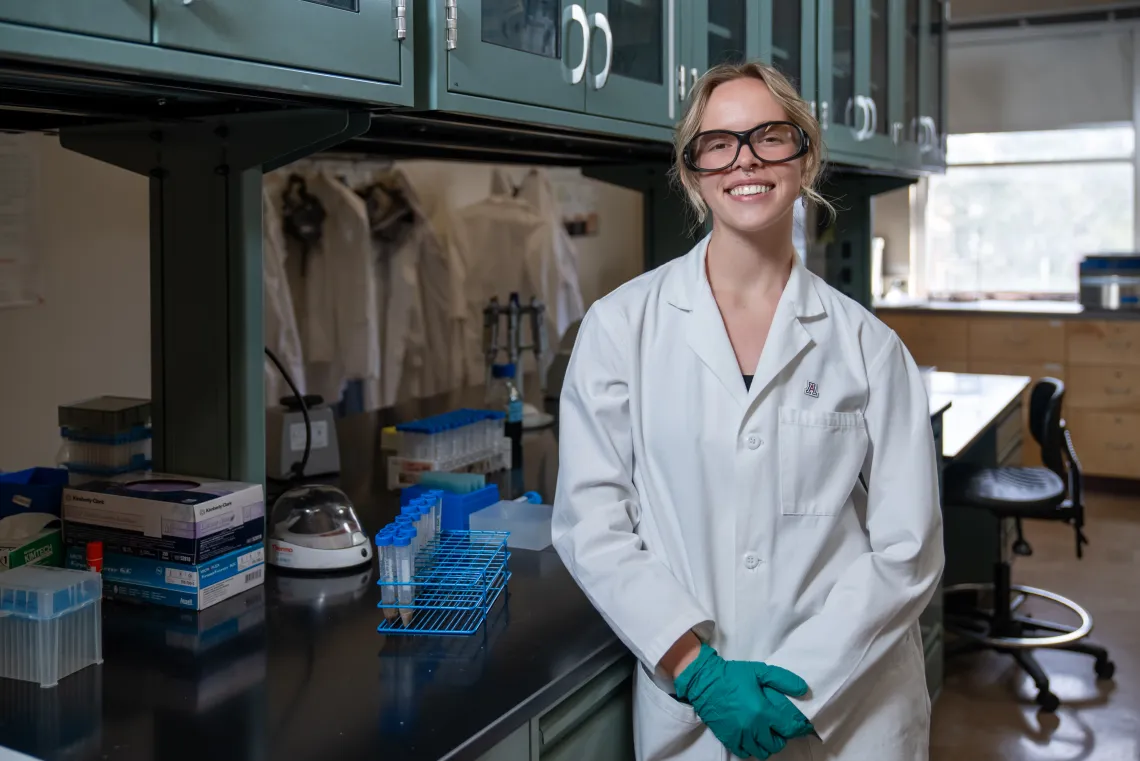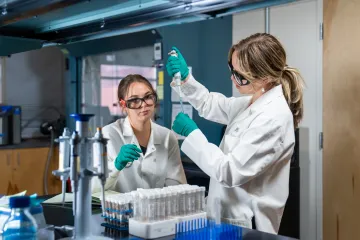Decoding Evolutionary Biology: Q&A with Undergraduate Researcher Paige Wagstaff

Credit: Andrew Bourland, University of Arizona
Paige Wagstaff — a senior majoring in anthropology with an emphasis in human biology and a minor in nutritional sciences — was a 2023-2024 undergraduate intern in LEEP, an evolutionary endocrinology lab housed in the School of Anthropology at the University of Arizona. This summer, she is an intern with the Undergraduate Biological Research Program, or UBRP, and spends part of her time researching samples collected from Madagascar. She recently talked about her research — why she loves primatology, learning to research ethically, and what her future might hold.
Why did you choose U of A?
Growing up in Utah, I felt a need to adventure somewhere new. I knew that I wanted to branch out and experience a new place to live. I originally applied to the University of Arizona since it looked fun, with such a stunning campus constantly under the sun. As soon as I was accepted into the university under a scholarship, I was absolutely sold. The U of A has been a great place to do my undergrad. It has been the place where I found my passion for anthropology, changing my entire life. Even more so, I have found a lab working with great people, not to mention I’ve met some of my best lifelong friends here.
Did you become interested in primatology and human biology before or after starting at U of A? What sparked your interest?
Coming to the University of Arizona, I had a very vague idea of what I wanted to do. I knew I wanted to study humans and the human body in some capacity, so I knew I wanted to study biology in some form. I started in the route of physiology but soon realized this was not for me. I wanted to study behavior and the social sciences, especially anthropology, which really fascinated me and fit my passions and what I was interested in. I took my first human evolutionary biology class sophomore year and fell in love with primatology, the study of human and non-human primates. I was fascinated by how we can learn about humans through our ancestors by studying behavior through observing non-human primates like lemurs, monkeys, and apes. I love how we simultaneously know so much and yet so little about our past, and I am excited to keep pursuing my interest in evolutionary biology to find a better understanding behind human behavior.
How has UBRP helped you with your research trajectory?

Credit: Andrew Bourland, University of Arizona
The UBRP has given me many opportunities and tools I will use to further my research. This program has opened my eyes to funding opportunities for research, allowed me to make friends also interested in biological research, and emphasized the importance of ethical research. This hands-on experience with UBRP has given me practice conducting my own research, learning new lab techniques, and given me great experience for future lab work and graduate school. I have gotten to work closely with my lab manager, Dr. Allison Hays, and I am grateful for her mentoring through this process. She is an advocate for me and pushes me to achieve my goals. I am also learning about how to share my research and promote my research to people. As research can be very competitive, I am practicing now how I can share my work while allowing others to understand and become interested in it. I also attended an ethics retreat at Biosphere 2 where we learned about ethical research and the great research being done there. It was a great time to meet new people. This program has allowed me to get paid for conducting research I am passionate about. Through UBRP I have been able to learn more about how to conduct ethical research through safe processes, data collection, and sharing data with accurate results. I am excited to hopefully continue UBRP into the next school year, and I will present my research at the UBRP conference next January!
Please tell us more about LEEP.
LEEP stands for the Laboratory for the Evolutionary Endocrinology of Primates and is directed by associate professor of anthropology, Dr. Stacey Tecot. In our lab, we focus primarily on hormones and the endocrine system. Dr. Tecot focuses her work on lemurs, specifically red-bellied lemurs (Eulemur rubriventer) that live in Madagascar. Dr.Tecot, along with graduate students in LEEP, has gone to Madagascar in the past and collected behavioral data, fecal samples, and urine samples to be shipped back to the United States, which allows us to run hormone analyses.
We focus on connecting behavioral data to hormone analysis to understand the physiological changes in lemurs. We also emphasize using non-invasive methods of sample collection. This allows us to have large data sets and low disturbance to the species we are studying. We are also branching into studying the gut microbiome of these lemurs.
Your plan to research lemurs in Madagascar this fall changed. What does that look like as you stay local and continue that work locally?
This is a great question! One question we are looking to understand right now is if we can use archived fecal samples to analyze the gut microbiome. The project I am working on is extracting DNA from microbes in fecal samples collected in 2022 under two different preservation methods, desiccation and storage in ethanol. We hope from this project to see which preservation method works best and if we can use older samples to connect the gut Microbiome data with behavioral and hormone data. As it can be hard to travel to Madagascar, we hope to use existing samples we have in the lab to understand lemur ecology and how they adapt to habitat disturbance. So, as I am working locally, I am still able to use samples collected from Madagascar and learn more about the lemurs there.
You’re attending a conference in Mexico this fall — tell us about it!
I am very excited to be going to Mexico this September for the American Society of Primatology (ASP) annual meeting of 2024. It will include getting to know and hearing about recent research being done in the primatology field. I am looking forward to going with my intern mentor and Ph.D. candidate Katie King. She was my mentor for the past school year, and I am grateful for her passion and commitment to teaching me and I enjoy working with her. This conference will allow me to network with potential schools or institutions that I may apply to for graduate school. Not only will I be learning about all current research undertakings, but I will also get to create new relationships and connections with people from around the world who are interested in primatology. People who are immersed in learning and researching the roots of humans through the study of non-human primates are able to view behavior through an evolutionary lens. We can also focus on conservation efforts for species that are endangered or are impacted by habitat disturbance. I am excited to see the research being done now and find where I can contribute and fit in. I am exceedingly grateful to the School of Anthropology for awarding me a scholarship to help cover the funds for this trip and experience.
What are your post-graduation plans? Do they involve lemurs?
Hm, that is the question: What do I do once I graduate? Looking toward the future, I am excited and nervous about what's ahead. I plan to go to graduate school and further my passion in anthropology and possibly zoology or ecology and evolutionary biology. I will most definitely be studying non-human primates and hope to be able to conduct my field research. I am also excited to travel and take some time to enjoy life. I am interested in studying the spectrum of sexuality in human and non-human primates and gaining evolutionary insights from our ancestors. I am interested in lemurs, but also want to branch out and study some of the ape family. Bonobos and chimps are humans' closest relatives, and I am curious to study their behaviors related to sociosexual behaviors and sexual selection theory. I hope to also emphasize conservation efforts for non-human primate species through my research and sharing my research. I am excited about the future and want to continue researching and asking questions about why humans are the way they are.
##

